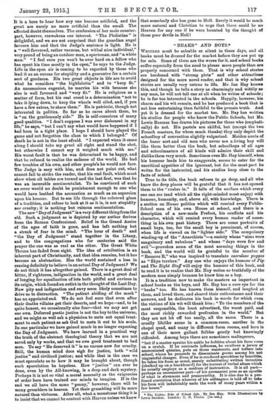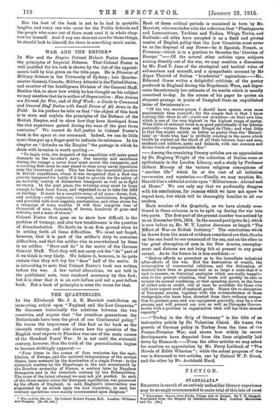"BEANS" AND BOYS.*
WRITERS meet be saleable or silent in these days, and all books must be dressed for the market before they are put up for sale. Some of them are the worse for it, and school books suffer especially from the need to please more people than are properly concerned with them. That is why school stories are burdened with "strong plots" and other attractions designed for the mere novel reader, and that is why school stories are usually very untrue to life. Mr. Ian Hay knows this, and though he tells a story as charmingly and wittily as any man, he will not tell one at all when ho writes of schools; he is far too interested in the schools. Happily, however, his charm and his wit remain, and he has produced a book that is not less entertaining than faithful to the prosaic truth. And yet it is dressed for the market too. Mr. Hay has written his studies for people who know the Public Schools, but Mr. Lewis Baumer has drawn his pictures for those who (emphati- cally) do not. His pastels are skilful, but (except the two French masters, for whom much thanks) they only depict the schoolboy of convention slightly vulgarized. Maiden aunts of the baser sort and old men who never see a living boy will like them better than the book, but schoolboys of all ages and schoolmasters of all kinds will admire their skill and dislike them very much. Sometimes even Mr. May himself, when his humour leads him to exaggerate, seems to cater for the uncritical appetites of the ignorant, but for the most part he writes for the instructed, and his studies keep close to the facts of school.
True to its title, the book refuses to go deep, and all who know the deep places will be grateful that it has not opened them to the "rusher in." It tells of the surface which every one can see (and which all the right-minded most enjoy) with humour, humanity, and, above all, with knowledge. There is a section on House politics which will remind every Public- School man of his own House at school, and there is a description of a new-made Prefect, his conflicts; and his character, which will remind every human reader of some- thing in his own past history. There are some portraits of mall boys, too, for the small boy is prominent, of course, when life is viewed on ita "lighter side." The compulsory winding-up of the "Anarchists "—a society whose "aims were sanguinary and nebulous" and whose "days were few and evil "—provokes some of the most amusing things in the book, and the world will be grateful to the member of "Remove B," who was inspired to translate eaeruleao puppes as "Skye terriers." Any one who enjoys the humour of Pip and The Right Stet will enjoy the humour of this book, and to read it is to realize that Mr. Hay writes so truthfully of the modern man simply because be knew him as a boy.
It is a tradition now to make the masters as important in school books as the boys, and Mr. Hay has a sure eye for the " beaks " too. He has known them himself, and laughed at them, and loved them, and shared their enthusiasms and their sorrows, and he dedicatee his book in words for which even the victims of his wit will thank him "To the members of the most responsible, the least advertised, the worst paid, and the most richly rewarded profession in the world." But they are not let off too easily, all the same. There is a cruelly lifelike scene in a common-room, another in the chapel quad, and many in different form rooms, and here is one of their more gallant foibles gently but knowingly ridiculed. Among boys there are sometimes malingerers, "but if a master sprains his ankle he hobbles about his form room on a crutch. If he contracts influenza, he swallows a jars. of ammoniated quinine, put. on three waietomite and totters into school, where he proceeds to disseminate germs among his not
ungrateful charges. Even if he is rendered speechlers by tonsilitie,
he takes his form as usual, merely substituting written invective (chalked up on a blackboard) for the torrent of verbal abuse which he usually employs as a medium of instruction. IL is all part—
perhaps an unconscious part—of his permanent pose as an apostle of what is strenuous and praiseworthy. It is also due to a pro-
found conviction that whoever of his colleagues is told off to take his form will indubitably undo the work of many years within a few hours."
• The Lighter Sid. of &hoot life. Hy Ism Hay. WS* Illurlastaons by Lewis Baumer. London: T. N. Ewa). [S. net.1 But the beet of the book is not to be had in quotable lengths, and every one who cures for the Public Schools and the people who come out of them must read it in whole chap- ters for himself. And if any one does not care for those things, he should look to himself, for there is something much amiss.



































 Previous page
Previous page